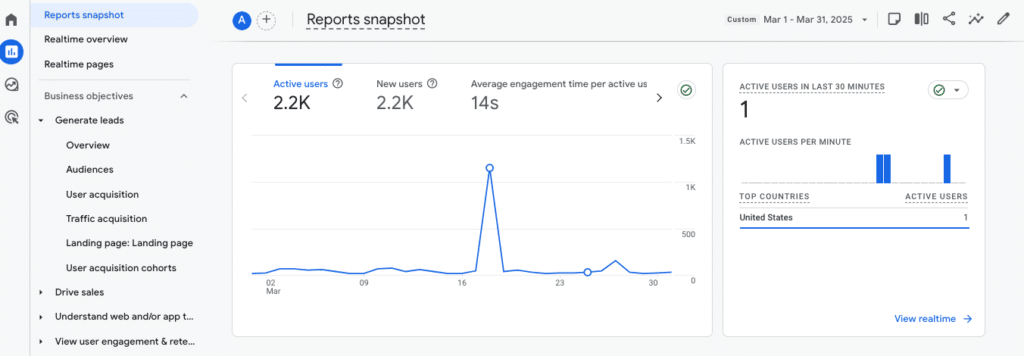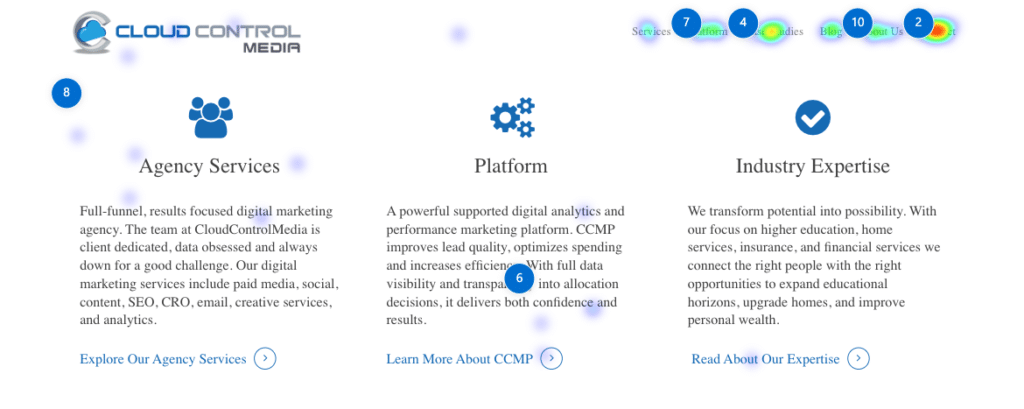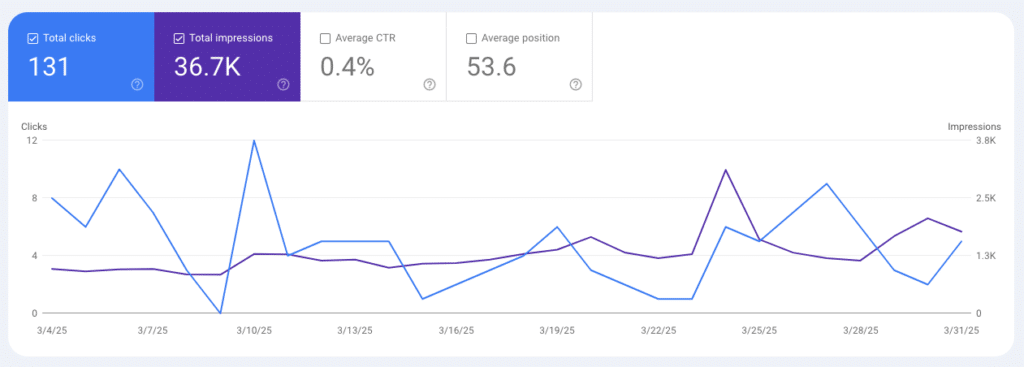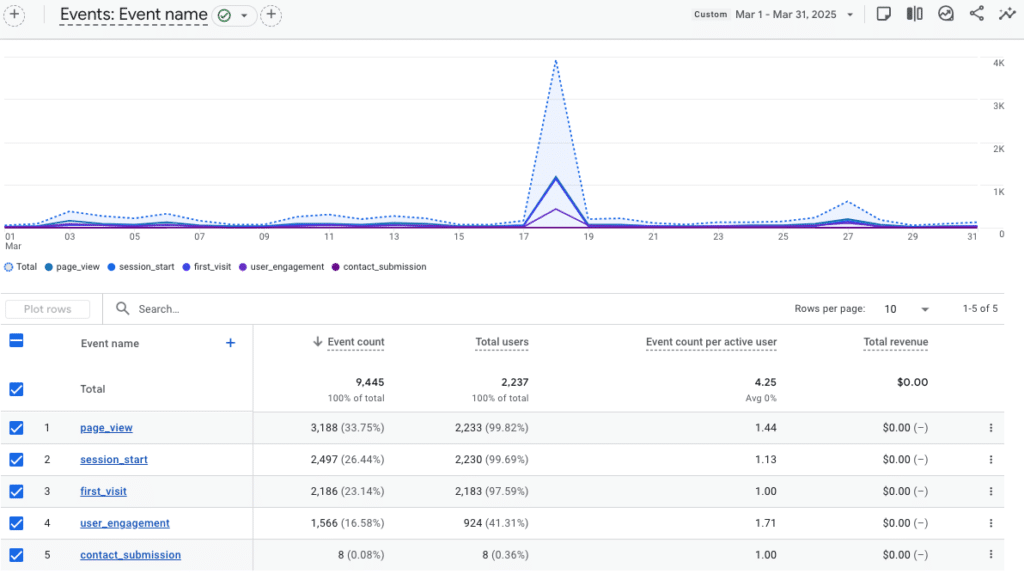How to Measure SEO Performance for Your Website

The best search engine optimization (SEO) strategies incorporate technical SEO and content so that your website reaches your target audience with messages that matter to them. Measuring SEO performance for your website, however, is not as simple as counting website visitors. There are many important SEO key performance indicators that you must review to assess your SEO strategies.
Popular SEO Performance Tracking Tools for Websites
Before you measure SEO performance, you must set up the appropriate tracking for your website. Many free and paid performance tools are available.
Google Analytics
Google Analytics, a free tool from Google, is one of the most widely used SEO performance tools. Analytics provides detailed data and information about your website visitors. You can view website sessions and users by channel (organic, paid, referral, etc.) and by webpage. Analytics also includes audience information like location, device type, and browser type.
In addition to user and session information, Google Analytics tracks common website events like page views, file downloads, and clicks. You can also create custom events to measure website conversions or other important actions.
Google Search Console
Google Search Console is another free tool that shows technical and keyword performance for your website. For technical SEO, you can view how Google crawls and indexes your webpages. For keywords, Search Console lists all keywords for which your website receives impressions and clicks in Google organic search.
SEO Keyword Tools
Since Search Console’s keyword reports are limited, you must choose an SEO keyword tool for detailed performance. While free tools are available, the best keyword tools are paid versions of SEMrush and Moz.
These paid keyword tools allow you to track keyword rankings, identify content gaps, and conduct competitor research. You can also use these tools to research and find target keywords for website content.
Website Crawlers
For advanced technical website analysis, you can use a website crawler like Screaming Frog. These tools can crawl your website and identify all technical components, including URLs, redirects, meta tags, schema markup, and so on. Crawlers also help you find and fix broken links or other technical errors.
Website Heat mapping Tools
Heat mapping tools like Hotjar and Microsoft Clarity are mainly for conversion rate optimization efforts, but you can use them for SEO performance as well. These tools show you exactly how website visitors engage with webpages and content. You can even view actual website sessions from organic search. Heat mapping tools are essential when launching a new website for your business.
SEO Key Performance Indicators (KPIs) for Websites
Once you have the right tools available, you can review the most important KPIskey performance indicators to measure SEO performance.
Keyword Visibility and Rankings
Although the online landscape continues to evolve, SEO is still all about keywords. You must review all keywords for which your website ranks in organic search. While it is important to track all your keywords, you should prioritize keywords in the top 10 of organic search results. This is because studies suggest that most organic clicks occur in the top 10 (or first page) of Google search results.
In addition to keyword rankings, you should also track your website’s Google search features. Keyword tools like SEMrush show your website’s featured snippets, AI overviews, local packs, and other features. These search features continue to appear more and more in search results.
Impressions and Clicks
Organic impressions and clicks, which are available in Search Console, provide an overview of website visibility in Google organic search. Organic impressions are how many times your website appears in organic search results. Organic clicks are how many times somebody clicks on one of your organic listings.
Impressions are becoming increasingly important with the rise of zero-click searches in Google. Google often answers queries directly in search results, so you do not always receive clicks even with top keyword rankings. In these cases, impressions nonetheless indicate how frequently your audience sees your website in organic search.
Website Traffic
Website traffic remains one of the default performance measures for SEO. There are two common metrics in Google Analytics for traffic: users and sessions.
- Users: unique visitors to your website
- Sessions: individual website visits to your website
Sessions are usually greater than users because one user can have multiple sessions.
To assess SEO performance, you should filter website traffic by organic channels. The most common organic channel is organic search, but there are others like organic social, organic YouTube, and Google Business. You can also filter traffic by page to identify top-performing content.
Branded vs Non-branded Website Traffic
Another consideration with website traffic is whether it comes from branded or non-branded keywords. Branded keywords include your brand name, business name, or any other terms and even acronyms that directly relate to your brand. In general, non-branded traffic is a better measure of SEO performance. An increase in non-branded traffic likely indicates that your SEO efforts are helping you increase your online audience. Branded traffic is not as important because you will almost always rank for branded keywords – regardless of your SEO strategies.
A simple way to measure non-branded vs branded performance is to filter out branded keywords in your reporting.
Website Engagement and Events
Keyword visibility, impressions, clicks, and traffic measure how people get to your website. Engagement metrics show what they do after they visit your website. Popular engagement metrics in Google Analytics are:
- Session duration: how long do sessions last
- Pages per session: how many pages visitors view per session
- Bounce rate: percentage of visitors who leave without taking another action (such as viewing another page)
For more advanced website engagement reports, you can use a tool like Hotjar to create heat maps, scroll maps, and click maps for priority webpages.
Website Conversions
The most important engagement metric is conversion. Common website conversion actions are contact submissions and requests for more information. However, you can set up additional conversions for button clicks, link clicks, file downloads, and so on. Not only should you track conversion amounts; but you should also track conversion rate (conversions divided by users or sessions).
Tracking conversion rate by channel and page is important because it gives you an idea how your SEO efforts relate to actual business performance. For example, you may find that certain website content is more likely to generate conversions than others. Conversion also helps you calculate an estimated return on investment (ROI) for SEO.
Domain Authority and Backlinks to Website
A backlink is any link from an external website to your website. Back links have historically been one of the most significant measures of SEO performance. In fact, Google’s original PageRank algorithm prioritized backlinks to rank websites. While the algorithm has significantly changed since then, backlinks remain a critical SEO measure. A simple way to view backlinks is as votes to your website content. When somebody links to your website, it is as if they vote that your content is valuable. That said, backlink quality is more important than quantity. A backlink from a popular, highly-regarded website is usually more valuable than one (or even two) from a less popular website.
Many keyword tools use a metric called domain authority to measure backlink profiles. Domain authority factors in the quantity and quality of backlinks, spam, and among other factors, to give your website an authority score. The higher the score, the more likely you are to rank in relevant search results. Domain authority scores range from 1-100, with 100 being the highest authority. An example of a high-authority website is coursera.org. Coursera’s Moz domain authority score is 92 because it has quality website content, 400,000 ranked organic keywords, back links from over 240,000 domains, and a 1% spam score.
Cloud Control Media and SEO Agency Services
Researching, planning, implementing, and measuring SEO strategies can be daunting for business owners and website managers. Fortunately, Cloud Control Media is here to help. We offer SEO services that align traditional SEO best practices with your unique business goals. Our analytics and reporting team can also create custom reports to track all your SEO performance data in one place. Contact us today to learn more.





